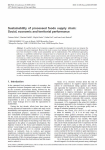Beber C.L., Padilla M., Razès M., Fort F., Rastoin J.-L. (2016). Sustainability of processed foods supply chain: social, economic and territorial performance. BIO Web of Conferences, 26/10/2016, vol. 7, p. 1-9. 39. World Congress of Vine and Wine, 2016/10/24-28, Bento Gonçalves (Brésil).
https://doi.org/10.1051/bioconf/20160703009
https://doi.org/10.1051/bioconf/20160703009
| Titre : | Sustainability of processed foods supply chain: social, economic and territorial performance (2016) |
| Auteurs : | C.L. Beber ; M. Padilla ; M. Razès ; F. Fort ; J.-L. Rastoin |
| Type de document : | Article |
| Dans : | BIO Web of Conferences (vol. 7, October 2016) |
| Article en page(s) : | p. 1-9 |
| Langues : | Anglais |
| Langues du résumé : | Anglais |
| Catégories : |
Catégories principales 04 - DEVELOPPEMENT LOCAL ET REGIONAL ; 4.3 - Appellations liées au Territoire. Produits du Terroir. QualitéThésaurus IAMM DURABILITE ; CHAINE DE VALEUR ; CHAINE ALIMENTAIRE ; TERRITOIRE ; DEVELOPPEMENT DURABLE ; PERFORMANCE ; ANALYSE SOCIALE DU CYCLE DE VIE ; VIN ; BOURGOGNE ; ENQUETE ; FRANCE |
| Résumé : | In a global market, food companies engaged in sustainable development must now integrate the economic and social component. However the tools to assess it are lacking. Several theoretical frameworks have been developed to define social sustainability and its implementation. The attributional approaches, pathways or capabilities methods have emerged, based on a functional unit of a good or service along the supply chain. This paper proposes a new method to assess social economic and territorial performances of a food chain as a whole on a Territory. It is divided into four components: (i) dignity and well-being of workers, (ii) contribution to local life, (iii) fairness and integrity of business practices, and (iv) creation of material and intangible wealth. 50 criteria are used according to international, national or sectoral references. This generic method applicable to any sector of processed food products aims to identify where are the areas of improvement to qualify the sector as socially sustainable. An application to the wine Beaujolais and Burgundy wine was performed from surveys of 35 production and trade operators in 2014. The results show that the sector is particularly effective for the promotion of the territory, local life participation, loyalty and integrity of business practices; some improvement is still possible for the welfare of workers and the creation of material wealth. This method can be coupled with the environmental performance determined by the life cycle analysis in order to assess the sustainability in its entirety. |
| Congrès : | 39. World Congress of Vine and Wine, 2016/10/24-28, Bento Gonçalves (Brésil) |
| Cote : | En ligne |
| URL / DOI : | https://doi.org/10.1051/bioconf/20160703009 |
Documents numériques (1)
PRO37216.pdf Adobe Acrobat PDF |














